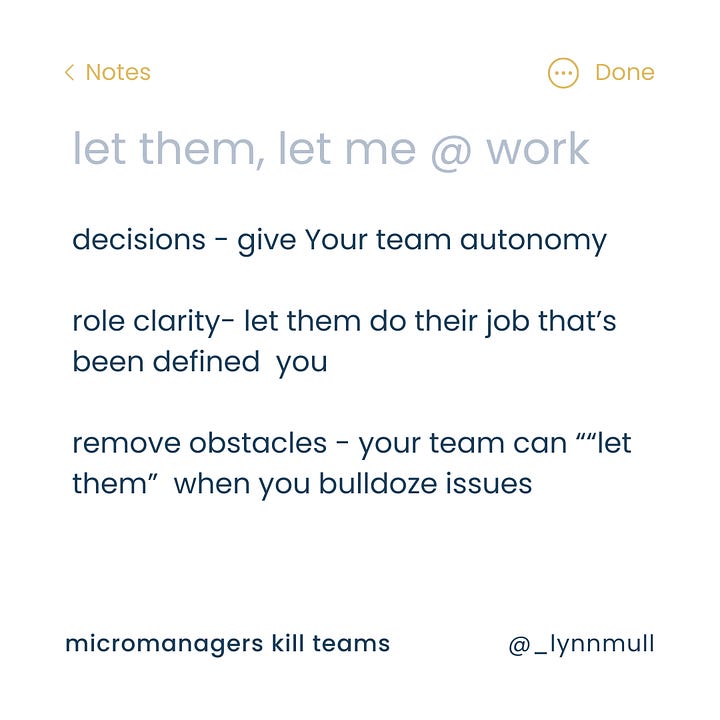"Let Them" is shaping up to be the book of 2025, developed by Mel Robbins with her signature research-based approach, blending personal anecdotes and expert insights. From friendships to breakups and, yes, colleagues, Robbins offers a framework for releasing control, setting boundaries, and navigating relationships with grace.
As usual, I’m taking a professional spin on her advice—focusing on what it means to "Let Them" and, most importantly, "Let Me" as a leader in the workplace.
Mel Robbins: The Leadership Oprah
Mel’s style of life coaching is steeped in her own hero’s journey—moving from being in debt and running failing businesses to becoming a globally recognized speaker and author. Her "street cred" comes from personally testing out theories and sharing honest reflections, making her advice deeply actionable. What sets her apart is her access to top experts in neuroscience and psychology, which illuminates how "Let Them" is as much about mental rewiring as it is about growth mindset.




"Let Them"
When I feel irritated by life’s big or small annoyances—from a messy kitchen to an unexpected work shift—I’ve started adopting a light-hearted mantra: “Let them.” It’s a simple yet powerful way to acknowledge that you can’t control everything but can always decide your next move. This mindset shift applies beautifully to the workplace, especially in leadership roles. Whether it’s unexpected InMails or unclear projects, my response has become: “Let them, but let me act in alignment with my needs.”
Cliff Notes of "Let Them" (Career Edition)
Here are the core lessons of Mel’s framework and how they apply to work:
People tell you who they are. Believe them.
Let everyone be who they are, but make clear decisions about how to work with them—whether that means moving toward or away from certain behaviors.You can’t change people, but you can reinforce healthy behaviors.
This applies to every type of relationship, especially professional ones. Focus on reinforcing what works and letting go of trying to “fix” everything.Ask yourself: What role have I played in this situation?
Leadership is about self-reflection. If something isn’t working—whether at home or in the office—ask what you need to recognize or shift in your approach.Set boundaries to protect your time and energy.
Boundaries aren’t just about saying no; they’re about knowing when to release control and when to step in with clear direction.Find peace in making aligned decisions.
For example, if you feel left out, what proactive steps can you take to create your own network of collaborators at work?
Biggest Lessons from "Let Them" for Leaders
Robbins also offers a downloadable "Let Them at Work" guide, which includes practical steps for letting your team do their jobs without micromanaging. Here are my favorite lessons from her guide:
Be decisive.
Leadership is about making informed decisions based on data and intuition. Without a clear destination, it’s impossible to chart a course forward.Clarify roles.
This is Leadership 101, yet so often overlooked. If you struggle to delegate or let go, dig deeper to understand why. I’ve worked in cultures where upper management’s micromanaging made it hard to create clarity, but acknowledging that hurdle is the first step to changing it.Authenticity—done right.
While full authenticity isn’t always practical in old-school workplace cultures, you can still humanize work by:Helping people pursue what they care about. Ask: What do you want to learn or do? Then help remove obstacles so they can grow.
Asking better questions. Replace generic chit-chat like “How was your weekend?” with more specific, thoughtful questions that build trust and foster genuine connection.
Final Thoughts: Let Them, Let Me
Personal relationships inevitably impact our professional lives. Robbins’ book helps leaders find peace in letting go of unnecessary control while taking aligned actions that support their teams. For me, "Let Them, Let Me" is about allowing space for others to do their best work—with clear directions—and for myself to show up as a calm, thoughtful leader.
By letting your team members be, you create room for growth, innovation, and trust. That’s leadership redefined.




